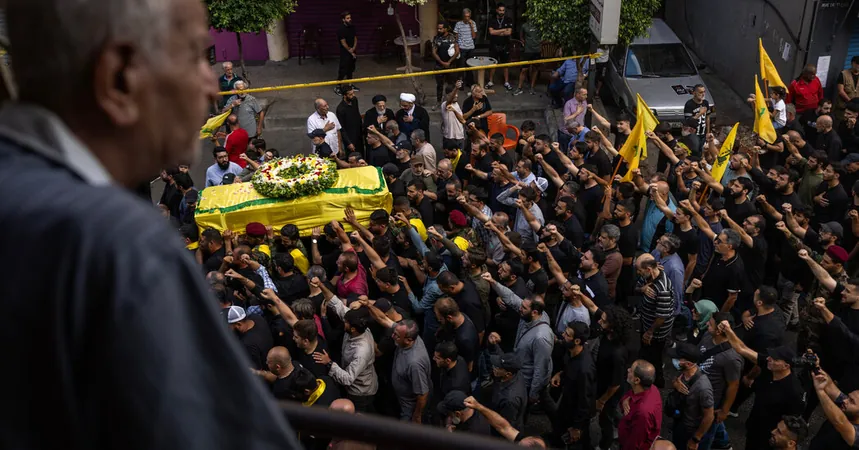
Explosive Tension: Hezbollah Walkie-Talkies Detonate in Lebanon, Causing Widespread Chaos and Casualties
2024-09-18
Explosive Tension in Lebanon
In a shocking escalation of violence, walkie-talkies intended for Hezbollah members have exploded, leading to a tragic toll in Lebanon. On Tuesday, explosive devices concealed in pagers detonated, killing at least 12 people and leaving thousands injured. The chaos continued into Wednesday with a subsequent blast from walkie-talkies that claimed at least 14 more lives, according to the Lebanese health ministry. This unprecedented event marks a significant blow to Hezbollah, a group noted for its military sophistication and deep-seated influence in Lebanon.
Impact on Israeli-Hezbollah Relations
Israeli officials have not claimed responsibility for these deadly attacks. However, the underlying tensions between Israel and Hezbollah have reached a boiling point. Israeli Prime Minister Benjamin Netanyahu reaffirmed his commitment to ensuring the safety of northern Israeli residents displaced by Hezbollah attacks, asserting, “We are determined to return the residents of the North securely to their homes.”
Hezbollah's Ongoing Conflict with Israel
Hezbollah, characterized as a terrorist organization by the United States, has been engaged in making cross-border strikes on northern Israel since last year, aligning itself with Hamas amid ongoing conflicts in Gaza. The rise of violence has raised alarms among global leaders, who fear that the situation might spiral into a broader regional conflict involving Iran, a primary supporter of both militant factions.
The Triggering of Misguided Violence
Tensions peaked in recent months, especially after the assassination of high-ranking Hezbollah commander Fuad Shukr by Israeli forces in July, a move that Hezbollah vowed to avenge. The exchange of fire along the Lebanese-Israeli border has been steady and destructive, resulting in casualties on both sides. The continuous skirmishes have raised serious apprehensions regarding the potential for a wider war that could engulf the entire region.
Speculations of Retaliation from Hezbollah
Military experts suggest that both Israel and Hezbollah have shown a degree of restraint until now, but the chaotic events of this week could change that dynamic. General Herzi Halevi, the chief of staff of the Israeli military, expressed a clear intent to prepare for possible escalation with Hezbollah. “The price for Hezbollah must be high,” he warned, indicating that a robust military response could be imminent.
Aftermath and Community Sentiment
Following the bombings, the disarray within Hezbollah has fueled speculation about the group’s next steps. The group is caught in a precarious situation; any retaliatory actions may solidify its image as an unwavering ally to Hamas while simultaneously increasing vulnerability to Israeli aggression.
Hezbollah's Psychological and Operational Impact
The nature of the detonations has left Hezbollah reeling both physically and psychologically. The local health minister noted that the attacks left upwards of 2,800 injured, many suffering critical wounds. As mourners gathered for funerals of the victims, including young children, the community's sorrow turned to anger, with promises of vengeance from Hezbollah’s ranks.
Risks of Exposure for Hezbollah Members
Notably, Hezbollah has maintained a tight-knit structure, often concealing the identities of its operatives and signaling. The ramifications of this attack may expose members who sustained visible injuries, risking their covert roles within the group.
Efforts for Diplomatic Resolution
In light of this unsettling escalation, global diplomats remain fervently engaged in efforts to mediate a resolution and prevent further violence. Yet, with Hezbollah linked closely to the warfare in Gaza, any peace negotiations there could shape the ever-evolving conflict on Israel’s northern front, threatening to drag more nations into a potentially catastrophic confrontation.
Conclusion: A Call for Diplomatic Solutions
As the impacts of these unforeseen attacks reverberate through the region, the world watches cautiously, hoping for a shift towards diplomacy rather than continued bloodshed between these entrenched adversaries.


 Brasil (PT)
Brasil (PT)
 Canada (EN)
Canada (EN)
 Chile (ES)
Chile (ES)
 España (ES)
España (ES)
 France (FR)
France (FR)
 Hong Kong (EN)
Hong Kong (EN)
 Italia (IT)
Italia (IT)
 日本 (JA)
日本 (JA)
 Magyarország (HU)
Magyarország (HU)
 Norge (NO)
Norge (NO)
 Polska (PL)
Polska (PL)
 Schweiz (DE)
Schweiz (DE)
 Singapore (EN)
Singapore (EN)
 Sverige (SV)
Sverige (SV)
 Suomi (FI)
Suomi (FI)
 Türkiye (TR)
Türkiye (TR)